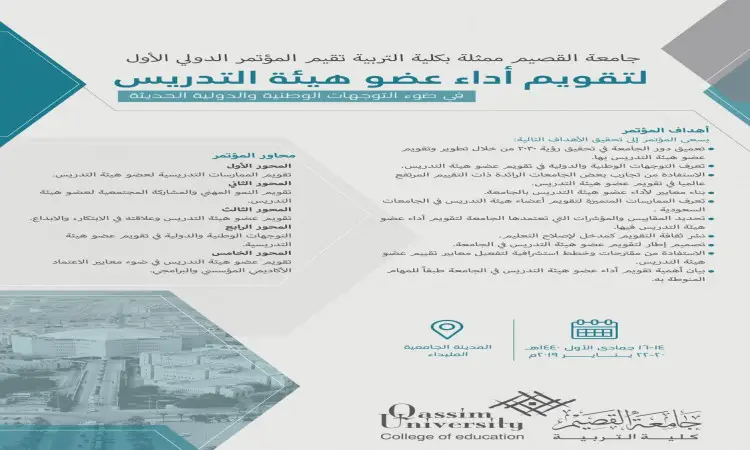The University, represented by the College of Education, is preparing to organize the first international conference on the performance of university faculty members during the period from 14-16 Jamadul Awwal 1440 A.H., corresponding to January 20-22, 2019, under the title "Evaluating the performance of the faculty member ... in the light of modern national trends". This is based on the university's vision of supporting sustainable development, providing distinguished education and contributing to building a knowledge society, and its mission that seeks to provide advanced university education and distinguished community services, under the supervision and patronage of His Excellency Prof. Dr. Abdulrahman bin Hamad Al-Dawood, President of the University.
For his part, Dr. Sami bin Fahad Al-Sunaidi, Dean of the College of Education, explained that the conference aims to achieve several objectives, including: Deepening the university's role in achieving Vision 2030 through the development and evaluation of the faculty member, identifying national and international trends in evaluating him, benefiting from the experiences of some leading universities with high evaluation globally in this field, in addition to building standards for the performance of the faculty member at the university.
Al-Sunaidi pointed out the importance of spreading the culture of evaluation as an entry point for educational reform, designing a framework for evaluating the faculty member at the university, utilizing forward-looking proposals and plans to activate his evaluation criteria, explaining the importance of evaluation according to the tasks assigned to him, identifying the distinguished practices of evaluating them in Saudi universities, and identifying the measures and indicators adopted by the university to evaluate the performance of the faculty member.
Al-Sunaidi added that the themes of the conference vary among several axes, the first of which is: The second axis is the evaluation of the professional growth and community participation of the faculty member, while the third axis deals with the evaluation of the faculty member and its relationship with innovation and creativity, while the fourth axis is concerned with the national and international trends in the evaluation of the faculty member, and the last axis is about the evaluation of the faculty member in light of the standards of institutional and programmatic academic accreditation.
Al-Sunaidi explained the controls for selecting the research and scientific papers participating in the conference, which are that the research must be within the themes or topics of the conference and follow the approved scientific methodology, and the research or scientific paper submitted to the conference has not been previously published for any other entity, whether a scientific journal, conference, or any other means, as the initial and final approval is issued according to the registration procedures and conference instructions.
Al-Sunaidi added that the research submitted to the conference must be sent as a Word file, and the number of research pages must not exceed 30 pages, including references and appendices, and the research must contain (research title - researcher's name - university or organization he works for - country) in Arabic and English, an abstract in Arabic and another in English, and the use of APA in documentation and referencing, preferably with a PowerPoint filePowerPoint The aim is to present the research or working paper within the conference agenda in no more than 15 minutes.
It is noteworthy that the deadline for receiving abstracts is 29/1/1440 AH, corresponding to 9/10/2018, and should be sent to the email address edcd@qu.edu.sa The deadline for receiving research papers is 29/3/1440 H, corresponding to December 7, 2018.


